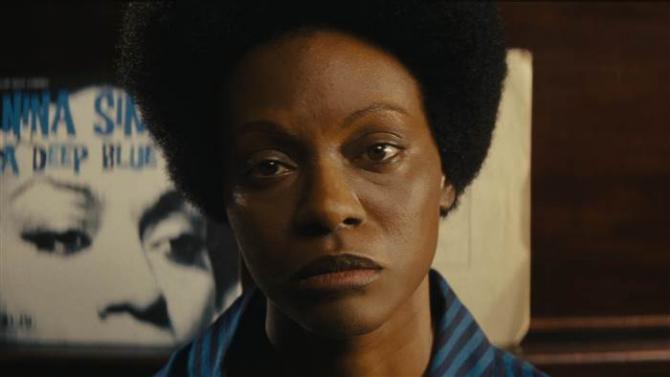[ad_1]

Zoe Saldana as Nina Simone in Nina.
RLJ Entertainment
Let’s get this out of the way: Nina, the much-discussed biopic about legendary songstress Nina Simone, is bad. Really bad.
Now let me explain why.
Lady Sings the Blues is my favorite movie. I am equally obsessed with Diana Ross and Billie Holiday. The merger of the two was cinematic gold. I have watched LSTB at least 150 times.
So why am I telling you this?
Because I think Blues is what Nina director and script writer Cynthia Mort was trying to re-create. Nina comes replete with Simone (Zoe Saldana) doing a stint in a mental hospital like Holiday in Blues, Holiday’s heroin addiction in Blues is Simone’s alcoholism in Nina, and Nina includes a random phone call and flashback with Richard Pryor (Mike Epps), a throwaway scene that I swear made the final cut in Nina just because Pryor played Holiday’s bestie and drug partner in Blues. Nina culminates much the same way as Blues whereas Holiday is trying to land a gig at Carnegie Hall, while Simone is trying to get back to performing in America, specifically in Central Park.
For those of you who were greatly concerned about Zoe Saldana in blackface, film stills of Saldana as Nina do not do justice to just how bad her makeup looks in high definition and on the big screen. Saldana’s bad makeup makes her look like one of those overly tanned people who’ve spent a two-week vacation baking in the sun. Except worse.
You know how sometimes when you’re watching a biopic and the actor playing a well-known character doesn’t really look like that person (Jeffrey Wright as Martin Luther King Jr. in HBO’s Boycott, for instance), but the acting is so good that you forget about the appearance and get sucked into the story?
Yeah, no. That never happens in Nina.
An actor playing in a biopic has to go all Courtney B. Vance as Johnnie Cochran in FX’s American Crime Story: The People v. O.J. Simpson and look like the person they’re playing. I was fine with Angela Bassett playing Tina Turner, Denzel Washington as Malcolm X, and Diana Ross and Audra McDonald as Billie Holliday. These roles worked well because: One, nobody wore blackface and two, the aforementioned are all exceptional actors.
Exceptional actors are distinguished by their ability to catch all the characters ticks; in short, they become the character. Saldana might have the acting chops to do that, but she didn’t display them in Nina. Saldana wears Simone’s wardrobe of fabulous kaftans and head wraps and earrings, recites the script and goes through the dramatic motions, but she never becomes Simone the way, say, Chadwick Boseman became James Brown in Get On Up. I’ve watched Saturday Night Live cast members do a better job of portraying celebrities.
The script for Nina is so-so. Early on in the story, Simone lands in the psych ward. There, she meets Clifton Henderson (David Oyelowo), a nurse who reluctantly agrees to travel to France to become her personal assistant. Henderson’s primary role is serving a temperamental Simone copious amounts of champagne. His secondary duties include sitting idly by during social calls as Simone drinks more heavily and pretends Henderson is also her lover. Eventually, he gets fed up and leaves, only to return later and help Simone get healthy enough to perform again. It’s not a bad story, but the telling is disjointed. The film uses a vintage interview with Simone to tie the narrative together.
Nina relies heavily on musical performances, which is no surprise, given that the subject is a legendary musician with 41 albums and 400-plus songs, according to the film. What was surprising is that Saldana sings Simone’s catalog. Yes, you read that correctly. Hearing Simone sing could have been the potential saving grace for Nina. The acting is questionable but at least viewers could have enjoy the music. But nope! Saldana can hold an all-right note but not a candle to Simone.
Nina does have a few highlights. Everyone who worked on the costumes deserves a slow clap, especially for the accessories. Also, David Oyelowo is a wonderful actor, even if he spends most of the film in brooding silence, looking confused, frustrated or curious. (Me too, Bruh. Me. Too.)
The best part of Nina are the three minutes Simone spends with Pryor, chatting on the phone and comforting the nervous comedian before he takes the stage. Epps, who was handpicked by Pryor to play him in an upcoming biopic, is Richard Pryor. He doesn’t just steal his scenes, he steals Nina from Saldana.
Nina is a great preview for Epps’s next big role. It’s a wasted opportunity to showcase Nina Simone, a bona fide icon who deserved much better than this.
[ad_2]






















